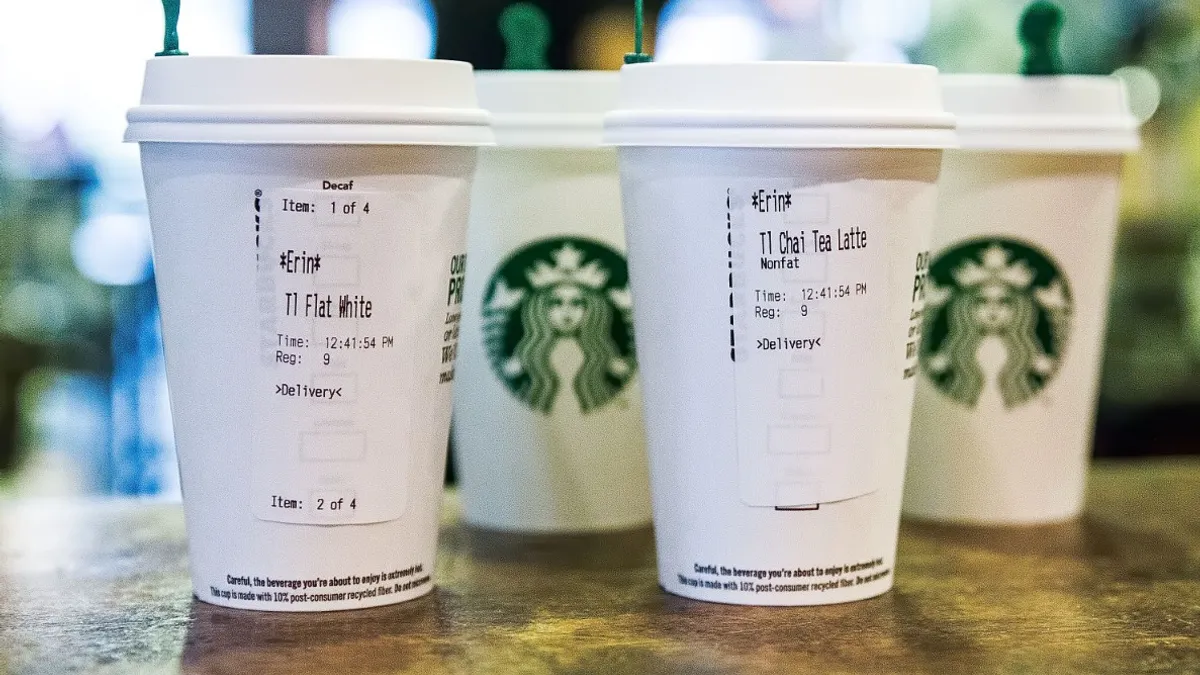Dive Brief:
- After completing a pilot program in Miami, Starbucks plans to expand its Starbucks Delivery program into a quarter of its U.S markets next year via a partnership with Uber Eats, Starbucks chief operations officer and group president Rosalind Brewer said during Starbucks Investor Day on Thursday.
- Starbucks also plans to begin a two-year renovation across a third of its portfolio that will allow for stores to integrate more technology and new format changes, such as express door pickups for mobile orders.
- The company will also enhance and grow its loyalty rewards and mobile ordering platforms, especially since digital customers tend to purchase two to three times as many products, Brewer said during the presentation. In spring, it plans to roll out an enhanced loyalty rewards program, which grew memberships by 15% during fiscal year 2018, that will allow customers to receive rewards after two to three visits.
Dive Insight:
With competitors like Dunkin' and McDonald's upping their delivery games, it's no surprise that Starbucks would do the same. The coffee giant's plans to expand its digital and technological platforms are part of its initiatives to better engage with the customers, executives said during its Investor Day.
"We must continue to adapt and adapt rapidly to meet our customers where they are," Starbucks CEO Kevin Johnson told investors.
Delivery isn't an entirely new concept for the coffee chain. Starbucks Delivers is exploding in popularity within its more tech-savvy markets in China, where it also is planning a massive delivery expansion. Delivery makes up a majority of orders in China, executives said.
By adding Uber Eats as its third delivery partner, the company is positioning delivery to be its fourth revenue pillar after in-store, mobile and drive-thru ordering. The Uber Eats partnership also marks the company’s largest roll out of delivery on a single platform — Starbucks delivery is only available in select markets through other third-party delivery services.
The coffee chain has been dabbling in delivery through a partnership with Postmates, which has expanded into 400 markets since 2015. The company also offers delivery via GrubHub.
Starbucks has also analyzed its portfolio to find under-penetrated markets — which include much of the Midwest — that could provide opportunities for expansion, especially when it comes to drive-thru locations, Brewer said. The coffee chain will also enhance ways to provide convenience to customers, especially since its drive-thru and mobile orders increased 10% in the U.S. over the last two years.
The chain also grew by 676 stores, of which 339 were drive-thru locations. The coffee behemoth increased comp sales by 2% and its net sales by 7%, Brewer said, and plans to grow its retail store portfolio 6% to 7% new units and grow same store sales 3% to 4% globally.
Starbucks' decision to throw its weight behind delivery could spark similar investments from industry rivals, especially since consumer demand for convenience shows no sign of slowing down. But given the company's powerhouse infrastructure and success with delivery in international markets, it seems unlikely those potential ripple effects would threaten Starbucks' lead.















